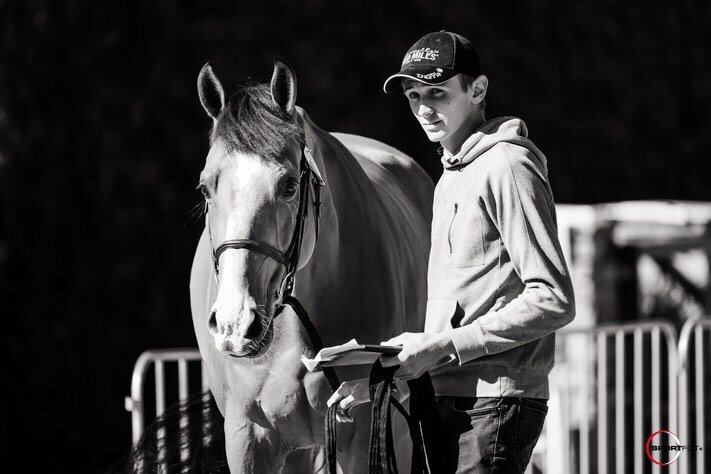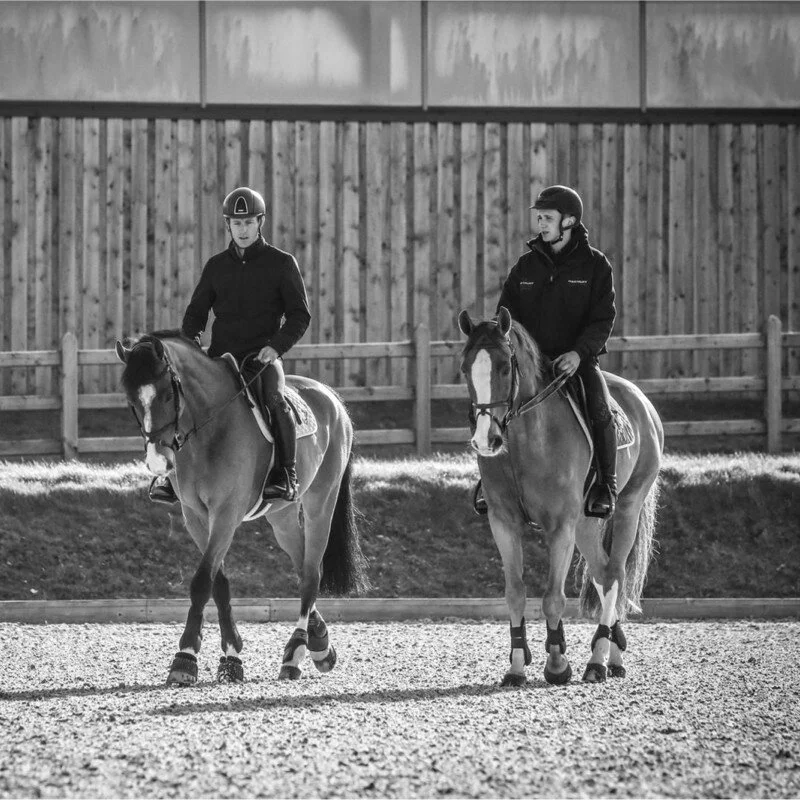The Season That Never Was - An Insight from Ben Phillips, Scott Brash’s Home Rider
Updated: March 2024
Looking back to the beginning of 2020 the suggestion of the current global situation would have simply been laughed off, however fast forward 10 months and the world is working through a pandemic. 2020 was supposed to be The Year for so many people around the world, but the Coronavirus pandemic has challenged us all to adapt in ways we never imagined.
How did this pandemic affect our equestrian athletes and their plans? We spoke with Ben Phillips, groom to MBE Olympic Gold Medalist Scott Brash, to gain an insight into how COVID-19 required their team to change plans and adapt.
EQ Team:
Looking back to that start of lockdown when restrictions were first in place, how did you and the rest of Scott’s team alter your approach to producing horses for top sport without having scheduled events to attend?
Ben Phillips:
‘The biggest challenge, to begin with, was the lack of a time frame for how long we would be going without competing.’
‘We were cautious of not letting the horses become too unfit as there was no way of knowing when the first shows would be, and we didn’t want to miss the first set of shows back by horses beginning merely unfit. This needed to be balanced by not keeping the horses in full competition work - they were ridden for the same amount of time each day, but at a lower work rate.
Reflecting on how the situation developed back on March 26 the UK went into National Lockdown resulting in the cancellation of equestrian events. British Dressage and British Showjumping shared a combined approach to suspending sport until the 19th April to fall in line with the Governments predicted timeline, however as we later learned the initial 2 week National Lockdown turned into months. As mentioned by Ben the lack of an exact time frame posed as an issue when keeping Scotts horses ready for competition. However, the time spent not being able to travel, competing and focusing on the top string of horses, allowed for the young horses to become the new focal point. This was also the case for other GBR riders such as Will Fletcher.
‘The break in our normal competition schedule gave a great opportunity for the younger horses to be produced and developed at home.’
EQuerry Team:
How do you think governing bodies have reacted to the pandemic in the UK and abroad in relation to transparent communication of guidelines?
Ben Phillips:
‘I believe messages were slow to pass on and took an effort to gain the information itself. ’
By August this year, equestrian activity and sport continued to take positive steps towards full resumption across Great Britain. As riders were able to return to the arena and everyone concerned were working hard within directives set by governments, it proved quite a minefield and became apparent that each UK Equestrian governing body took varied approaches to provide their members with up to date COVID guidance, and in particular when compared to the FEI, which we found to be more transparent, efficient and clear in their communications.
EQuerry Team
How do you suggest this could have been dealt with differently?
Ben Phillips:
‘Simply if the information they held was given out in a much clearer format. There needed to be a more straightforward path to find the information regarding different problems that we were facing.’
Sponsorship and Visibility in an Uncertain Season
The great lesson from 2020 wasn’t simply that competition can pause; it was that visibility must not. When live events halted, the traditional pathways that equestrian athletes and brands relied on; arena signage, prizegiving photos, mixed-zone interviews, vanished almost overnight. That same disappearance happened across sport, and it reshaped the sponsorship market in real time. In the early months of the pandemic, global sports sponsorship rights fees were projected to fall by roughly 37% from 2019 levels as schedules collapsed and brands pulled back or reworked deals. That contraction forced both athletes and rights holders to rethink how value was created and proven when there were no grandstands, no championships, and no broadcast prompts to drive recall.
What filled the gap was digital presence. Even as venues emptied, fan attention didn’t disappear, it migrated. Between late 2019 and early 2021, the number of fans who said they used social media for sports news or content rose by 83%, and athlete-owned accounts posted far more branded content (Nielsen tracked a 58% increase) as endorsement activity pivoted online. The social feed effectively became the mixed zone, and athletes became their own media channels. For sponsors, the calculation evolved from “How many in-venue impressions did we get this weekend?” to “How consistently can our partner reach and engage audiences when there is no event at all?”
Equestrian sport felt that stress acutely. The FEI’s calendar lost more than 1,100 international events in 2020, a stark reminder of how dependent the discipline is on the live circuit. Yet the sport also demonstrated how adaptable it can be when commercial models are diversified. As federations, teams, and athletes increased their digital output, international bodies leaned into platform-building: by 2021 the FEI reported multi-million-strong followings across its channels and positioned digital projects as core to raising its commercial profile. The direction of travel was consistent with the wider Olympic world, where Tokyo 2020 became the most watched Games ever on digital platforms, underscoring that even when stadiums are constrained, digital can scale global reach.
This shift mirrors patterns seen elsewhere. In the U.S. major leagues, sponsorship bounced back strongly as rights holders leaned into new digital assets and storytelling formats; by 2023, team sponsorship revenue across top leagues had surged ~17.5%, aided by innovations like jersey patches and creator-led media extensions. In parallel, college sport’s NIL economy exploded, formalising athlete-as-media dynamics. For equestrian partners, the takeaway is clear: invest in properties and athletes who can operate as year-round storytellers, not just weekend performers. The sponsorship that endures volatility is the one less vulnerable to a single calendar.
For riders and teams, uncertain seasons therefore argue for a broader communications architecture. A competition schedule will always be a pillar, but it shouldn’t be the only pillar. Consistent content, owned channels that keep communities active, and sponsor activations that live natively across social, web, and email are now part of core sport operations. In the years since, brands have also matured their expectations, shifting from passive logo placement to “business-backed” sponsorships, where partners actually power the performance and the fan experience with connectivity, logistics, health, or data. That trend rewards athletes and organisations that can show how a partnership improves the sport and the audience journey, not just how often a badge appears on a saddle pad.
Measuring ROI Beyond the Arena
If visibility diversified, measurement had to follow. Pre-pandemic, many equestrian partnerships were still benchmarked on the familiar trinity of broadcast exposure, on-site impressions, and podium moments. In 2020 that framework wasn’t available, and sponsorship needed proof that didn’t rely on rosettes. The industry response, mirroring other sports, was to elevate digital performance metrics from “supplementary” to “central.” Teams and athletes began using UTM tags, campaign-specific landing pages, and pixel-based attribution to connect Story taps and post clicks to downstream outcomes: Time on site, newsletter sign-ups, retail conversion, partner traffic, and CRM growth. The job wasn’t just making content; it was instrumenting it.
This is where equestrian can borrow directly from best practice elsewhere. Olympic and federation-level properties leaned into first-party data capture and content programming that extended outside event windows, because audience peaks increasingly occurred online. Deloitte’s 2022–2025 outlooks described a sports ecosystem where digital and physical are blending, with analytics at the centre of fan growth and monetisation. For a rider or stable, that looks like an always-on analytics stack that ties Instagram and TikTok discovery to website journeys and email nurture, and then surfaces partner-friendly reporting that can be shared monthly: reach, engagement quality, geographic splits, and attributable clicks to sponsor domains.
Pre-2020, only ~9% of sponsorship value was delivered through digital channels globally, according to Two Circles; an underweight share compared to where fans were already consuming. The pandemic shock accelerated that correction. By early 2021, Nielsen was documenting a sharp rise in both digital consumption and sponsorship activation online, and by 2023–2025, the broader sports market was normalising hybrid models in which digital reach and community engagement are considered co-equal to broadcast visibility. Women’s sport offered a striking case study: rapid audience growth and exceptional social engagement drew new sponsor categories and increased deal values, not because of legacy broadcast assets but because the digital product resonated with younger fans. These are instructive signals for equestrian, where the community is global, values-driven, and remarkably loyal once engaged. Two Circles (GB)Nielsen SportsNielsenThe Wall Street Journal
The practical implication is that riders and organisers should codify how partnerships are measured when arenas go quiet. That means setting campaign objectives that are agnostic to competition status, from audience growth targets, content completion rates, partner referral goals, and agreeing the data sources up front. It also means reporting cadence: Monthly sponsor dashboards that blend platform analytics with narrative context (“why this worked, what we’re testing next”) outperform raw numbers. Over time, that discipline makes partnerships anti-fragile: When a season stalls, the sponsorship doesn’t collapse with it, because both sides are already aligned on digital value and how it’s tracked.
Final Thoughts from the EQ Team
The season that never was confirmed something the industry suspected but hadn’t fully operationalised: performance matters, but presence sustains. In equestrian sport, where calendars can be disrupted and logistics are complex, the most durable commercial models are those that combine elite results with an audience strategy that stands on its own two feet. Sponsors are rightly asking for clarity and consistency; athletes and organisers who can deliver year-round visibility and auditable ROI will retain support through uncertainty and accelerate faster when normality returns. That isn’t a departure from tradition - it’s an evolution that protects the sport and the partners who fuel it.



